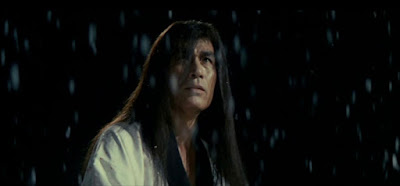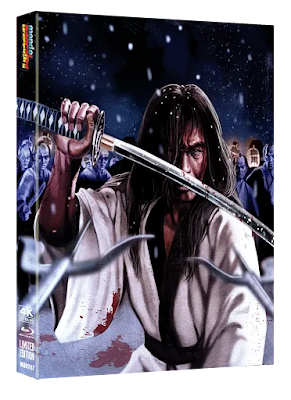 |
| Images courtesy of Toei |
Shiro doesn't seem to be offended at these practices, and the gang decides to hire him as an assassin to murder rival prostitution rings. As a protagonist, Shiro is an interesting choice because he doesn't have the strong sense of morality that most do in other films. He seems to have no pity for others (or himself, for that matter) and just drifts around doing whatever is needed of him. It's extremely off-putting to experience the narrative from his point of view, and he doesn't have any sort of character arc.
The stylized direction by Ishii is what keeps this film from diving too far down into soft porn/exploitation territory despite the copious amounts of sex and violence. His shot composition is beautiful and the fight scenes, while not on par with more mainstream samurai classics, are still quite good and dynamic. In the third act of the film, Shiro ingests a large amount of opium, and the visual aesthetic becomes very surreal and dream-like.
There are sex scenes set to neon lighting interspersed with dream sequences set in a misty forest. This all culminates with an insane battle between Shiro and a large group of assailants, with Shiro having to stab himself repeatedly to counteract the effects of the opium. It's a bizarre nightmare atmosphere, and it ends rather anticlimactically. I find that this fits with the theme of nihilism well, because according to Shiro, nothing he does has a point, and there is no end to his suffering, whether in life or death.
The commentary by Tom Mes has a lot of great information throughout. He covers the decline of Japanese cinema in the late '60s and the transition to transgressive content as well as the proliferation of pink films. Teruo Ishii thrived during this period and Mes explores his tendency to present historical films with stylized flourishes. Mes also dives into the history of the Edo period and how movies set during this period were used by modern directors for social commentary. The included booklet essay by Mark Schilling goes through the history of the ero-guro and "Toei Porno" sub-genres and some of the films that Ishii made that fit into that classification. The latter half of the essay analyzes the film itself, which is fascinating and illuminating.
4K FEATURES
Brand new 4K restoration from the original negative
UHD/BD combo
Audio commentary by Japanese film expert and author Tom Mes
Archive audio commentary from filmmakers J-Taro Sugisaku and Takao Nakano
Interview with Shinya Tsukamoto about the film and the career of Teruo Ishii
Archival interview with actress Yuriko Hishimi
Archival interview with J-Taro Sugisaku
Trailer
LIMITED EDITION FEATURES
2-disc UHD/BD combo; exclusive slipcover featuring new art by Justin Coffee; reversible inner sleeve with new art by Justin Coffee on the A side and original ad art on the B; booklet with new writing on the film by Japanese film expert Mark Schilling; 2000 numbered copies.
--Michelle Kisner


